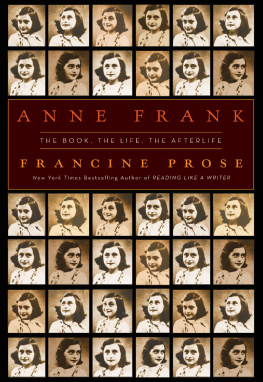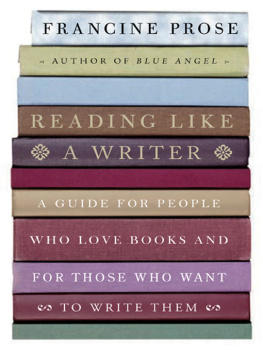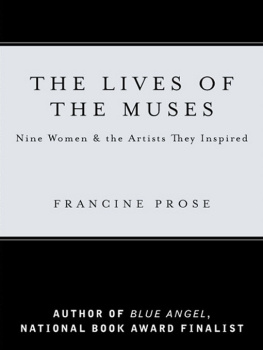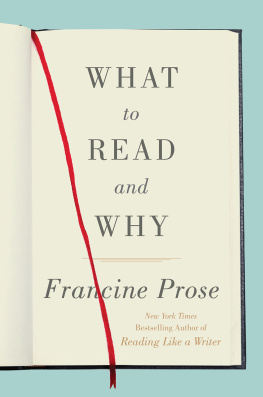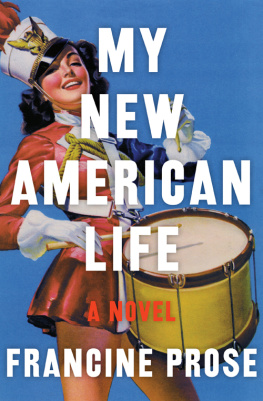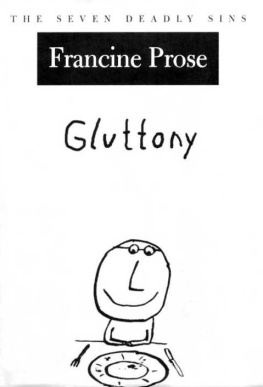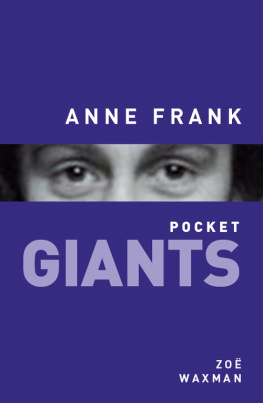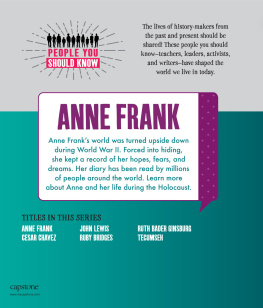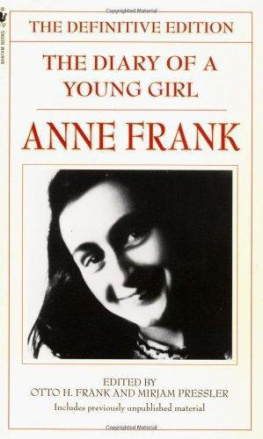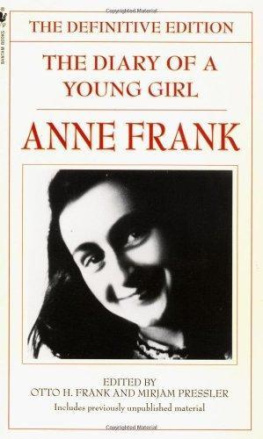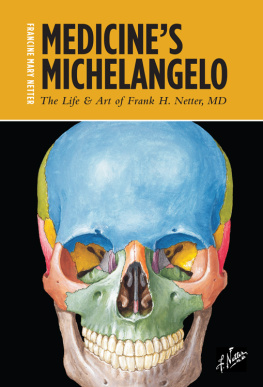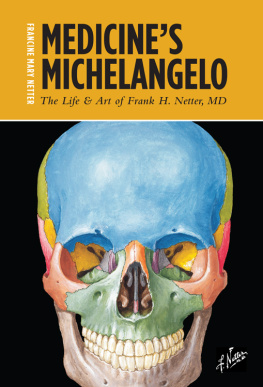Francine Prose - Anne Frank: The Book, the Life, the Afterlife
Here you can read online Francine Prose - Anne Frank: The Book, the Life, the Afterlife full text of the book (entire story) in english for free. Download pdf and epub, get meaning, cover and reviews about this ebook. year: 2010, publisher: HarperCollins, genre: Non-fiction. Description of the work, (preface) as well as reviews are available. Best literature library LitArk.com created for fans of good reading and offers a wide selection of genres:
Romance novel
Science fiction
Adventure
Detective
Science
History
Home and family
Prose
Art
Politics
Computer
Non-fiction
Religion
Business
Children
Humor
Choose a favorite category and find really read worthwhile books. Enjoy immersion in the world of imagination, feel the emotions of the characters or learn something new for yourself, make an fascinating discovery.
- Book:Anne Frank: The Book, the Life, the Afterlife
- Author:
- Publisher:HarperCollins
- Genre:
- Year:2010
- Rating:3 / 5
- Favourites:Add to favourites
- Your mark:
- 60
- 1
- 2
- 3
- 4
- 5
Anne Frank: The Book, the Life, the Afterlife: summary, description and annotation
We offer to read an annotation, description, summary or preface (depends on what the author of the book "Anne Frank: The Book, the Life, the Afterlife" wrote himself). If you haven't found the necessary information about the book — write in the comments, we will try to find it.
Anne Frank: The Book, the Life, the Afterlife — read online for free the complete book (whole text) full work
Below is the text of the book, divided by pages. System saving the place of the last page read, allows you to conveniently read the book "Anne Frank: The Book, the Life, the Afterlife" online for free, without having to search again every time where you left off. Put a bookmark, and you can go to the page where you finished reading at any time.
Font size:
Interval:
Bookmark:
The Book, The Life, The Afterlife

To Howie
The Life
The Book, The Life, The Afterlife
The Life
The Book
The Book, Part I
The Book, Part II
The Book, Part III
The Afterlife
The House
The Play
The Film
Denial
Anne Frank in the Schools
Teaching the Diary
Bard College, 2007
I would call the subject of Anne Franks Diary even more mysterious and fundamental than St. Augustines, and describe it as: the conversion of a child into a person. WhyI asked myself with astonishment when I first encountered the Diary, or the extracts Commentary publishedhas this process not been described before? universal as it is, and universally interesting? And the answer came. It is not universal, for most people do not grow up, in any degree that will correspond to Anne Franks growing up; and it is not universally interesting, for nobody cares to recall his own, or can. It took, I believe, a special pressure forcing the child-adult conversion, and exceptional self-awareness and exceptional candour and exceptional powers of expression, to bring that strange or normal change into view.
JOHN BERRYMAN, The Development of Anne Frank
She was a marvelous young writer. She was something for thirteen. Its like watching an accelerated film of a fetus sprouting a face, watching her mastering things. Suddenly shes discovering reflection, suddenly theres portraiture, character sketches, suddenly theres long intricate eventful happenings so beautifully recounted it seems to have gone through a dozen drafts. And no poisonous notion of being interesting or serious. She just is. The ardor in her, the spirit in heralways on the move, always starting thingsshes like some impassioned little sister of Kafkas, his lost little daughter.
PHILIP ROTH, The Ghost Writer
THE FIRST TIME I READ THE DIARY OF ANNE FRANK, I was younger than its author was when, at the age of thirteen, she began to write it. I can still picture myself sitting cross-legged on the floor of the bedroom in the house in which I grew up and reading until the daylight faded around me and I had to turn on the lamp. I lost track of my surroundings and felt as if I were entering the Amsterdam attic in which a Jewish girl and her family hid from the Nazis, and where, with the aid of their Dutch helpers, they survived for two years and a month, until they were betrayed to the authorities, arrested, and deported. I was enthralled by Annes vivid descriptions of her adored father, Otto; of her conflicts with her mother, Edith, and her sister, Margot; of her romance with Peter van Pels; and of her irritation with Hermann and Auguste van Pels and the dentist, Fritz Pfeffer, with whom the Franks shared the secret annex. I remember that when I finished the book, I went back to the first page and started again, and that I read and reread the diary until I was older than Anne Frank was when she died, at fifteen, in Bergen-Belsen.
In the summer of 2005, I read the diary once more. I had just begun making notes for a novel that, I knew, would be narrated in the voice of a thirteen-year-old girl. Having written a book suggesting that writers seek guidance from a close and thoughtful reading of the classics, I thought I should follow my own advice, and it occurred to me that the greatest book ever written about a thirteen-year-old girl was Anne Franks diary.
Like most of Anne Franks readers, I had viewed her book as the innocent and spontaneous outpourings of a teenager. But now, rereading it as an adult, I quickly became convinced that I was in the presence of a consciously crafted work of literature. I understood, as I could not have as a child, how much art is required to give the impression of artlessness, how much control is necessary in order to seem natural, how almost nothing is more difficult for a writer than to find a narrative voice as fresh and unaffected as Anne Franks. I appreciated, as I did not when I was a girl, her technical proficiency, the novelistic qualities of her diary, her ability to turn living people into characters, her observational powers, her eye for detail, her ear for dialogue and monologue, and the sense of pacing that guides her as she intersperses sections of reflection with dramatized scenes.
I kept pausing to marvel at the fact that one of the greatest books about the Nazi genocide should have been written by a girl between the ages of thirteen and fifteennot a demographic we commonly associate with literary genius. How astonishing that a teenager could have written so intelligently and so movingly about a subject that continues to overwhelm the adult imagination. What makes it even more impressive is that this deceptively unassuming book focuses on a particular moment and on specific people, and at the same time speaks, in ways that seem timeless and universal, about adolescence and family life. It tells the truth about certain human beings ineradicable desire to exterminate the largest possible number of other human beings, even as it celebrates the will to survive and the determination to maintain ones decency and dignity under the most dehumanizing circumstances.
Anne Frank thought of herself not merely as a girl who happened to be keeping a diary, but as a writer. According to Hanneli Goslar, a childhood friend, Annes passion for writing began when she was still in school. Anne would sit in class between lessons and she would shield her diary and she would write and write. Everybody would ask her, What are you writing? And the answer always was, Its none of your business. In April 1944, four months before the attic in which the Franks found refuge was raided by the Nazis, Anne Frank recorded her wish to become a writer. If I havent any talent for writing books or newspaper articles, well, then I can always write for myself. I want to go on living even after my death! And therefore I am grateful to God for giving me this gift, this possibility of developing myself and of writing, of expressing all that is in me!
Much has been made of how differently we see Anne Frank after the so-called Definitive Edition of her diary, published in 1995, restored certain passages that Otto Frank had cut from the version that appeared in Holland in 1947 and in the United States in 1952. In fact, though the Definitive Edition is almost a third longer than the first published version of The Diary of a Young Girl, the sections that were reinstatedbarbed comments about Edith Frank and the Van Pelses, and other entries revealing the extent of Annes curiosity about sexuality and about her bodydont substantially change our perception of her.
On the other hand, there is a scene in Miep Giess memoir, Anne Frank Remembered, that actually does alter our image of Anne. Along with the other helpers, the employees of Opekta, Otto Franks spice and pectin business, Miep risked her life to keep eight Jews alive for two years and a month, an experience she describes in a book that sharpens and enhances our sense of what the hidden Jews and their Dutch rescuers endured. The scene begins when Miep accidentally interrupts Anne while she is at work on her diary.
I saw that Anne was writing intently, and hadnt heard me. I was quite close to her and was about to turn and go when she looked up, surprised, and saw me standing there. In our many encounters over the years, Id seen Anne, like a chameleon, go from mood to mood, but always with friendliness. But I saw a look on her face at this moment that Id never seen before. It was a look of dark concentration, as if she had a throbbing headache. The look pierced me, and I was speechless. She was suddenly another person there writing at that table.
Font size:
Interval:
Bookmark:
Similar books «Anne Frank: The Book, the Life, the Afterlife»
Look at similar books to Anne Frank: The Book, the Life, the Afterlife. We have selected literature similar in name and meaning in the hope of providing readers with more options to find new, interesting, not yet read works.
Discussion, reviews of the book Anne Frank: The Book, the Life, the Afterlife and just readers' own opinions. Leave your comments, write what you think about the work, its meaning or the main characters. Specify what exactly you liked and what you didn't like, and why you think so.

